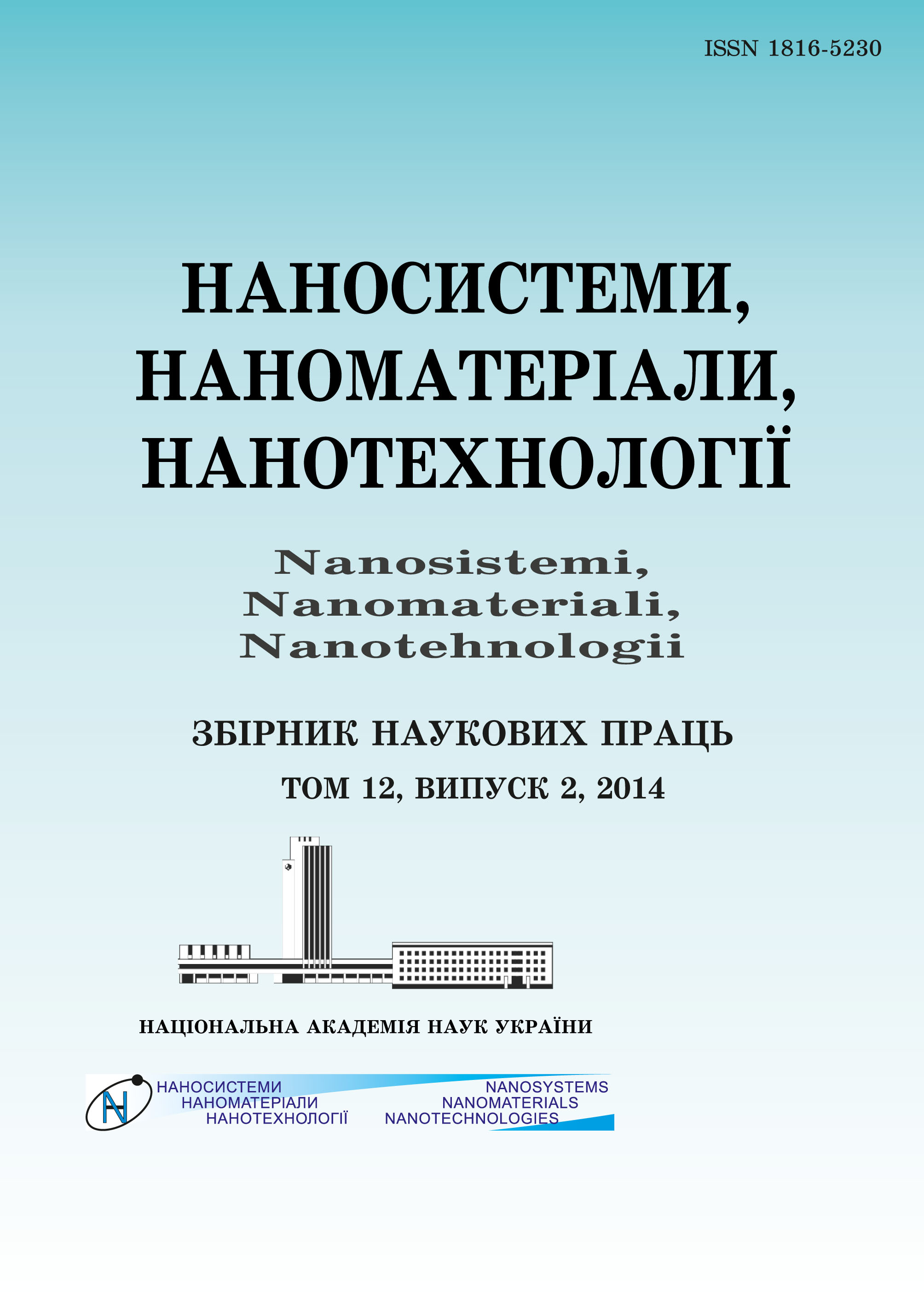|
|
|||||||||
 |
Year 2018 Volume 16, Issue 3 |
|
|||||||
|
|||||||||
Issues/2018/vol. 16 /Issue 3 |
O. I. Soshko, V. O. Soshko, and I. P. Siminchenko
«Mechanical–Plasma Treatment of Metal»
425–450 (2018)
PACS numbers: 34.35.+a, 52.77.-j, 81.15.Jj, 81.16.-c, 81.20.Hy, 81.20.Ka, 81.40.Np, 81.65.Cf
The necessity of solving new problems at the nanometre and ‘proton’ scales associated with the problem of solid-body destruction under conditions of reversible (adsorptive) interaction of the body with the medium is formulated. As shown, the general concepts of the physical nature of the appearance of physicomechanical properties of a solid under the influence of the medium are general thermodynamic concepts of the tendency of the free energy of a system to decrease due to the adsorption of the medium. Such macroscopic representations constructed without taking into account microscopic phenomena cause inadequate understanding and interpretation of the mechanism of environmental influence. This work discusses the decisive role of the crack as a factor initiating, at the time of destruction, various physical processes and phenomena of a quantum nature, which initiate not only multistage chemical transformations of the initial surface-active medium up to the formation of a hydrogen plasma, but also provide a prompt supply of protons into the region of plastic deformation in front of the crack tip. Conditions promoting the initiation and self-acceleration of chemical transformations of the medium within the destruction zone as well as the manifestation of a positive feedback between mechanical and chemical processes are revealed. A new method for forming structural parts by means mechanical–plasma treatment (MPT) of a metal is proposed.
Keywords: treatment, deformation, crack, fracture, activation, hydrogen, ionization, proton, plasma, diffusion, trap, structure, nanomaterials, strength
https://doi.org/10.15407/nnn.16.03.425
References
1. V. I. Likhtman, E. D. Shchukin, and P. A. Rebinder, Fiziko-Khimicheskaya Mekhanika Metallov (Moscow: AN SSSR: 1962).2. V. I. Likhtman, P. A. Rebinder, and G. V. Karpenko, Vliyanie Poverkhnostno-Aktivnoy Sredy na Protsessy Deformatsii Metallov (Moscow: AN SSSR: 1954).
3. Yu. V. Goryunov, N. V. Pertsov, and B. D. Summ, Effekt Rebindera (Moscow: Nauka: 1966).
4. E. D. Shchukin and P. A. Rebinder, Tezisy Dokladov IV Vsesoyuznoy Konferentsii po Kolloidnoy Khimii (Moscow: AN SSSR: 1958).
5. A. I. Soshko and V. A. Soshko, Smazochno-Okhlazhdayushchie Sredstva v Mekhanicheskoy Obrabotke Metalla (Kherson: Oldi-Plyus: 2008), vol. 1, 2.
6. V. A. Soshko and A. I. Soshko, Mekhanicheskaya Obrabotka Metallov (Saarbrucken: LAMBERT Academic Publishing: 2015).
7. A. I. Soshko and V. A. Soshko, Metallofiz. Noveishie Tekhnol., 39, No. 1: 117 (2017). https://doi.org/10.15407/mfint.39.01.0117
8. R. W. Christy and A. Pytte, Stroenie Veshchestva: Vvedenie v Sovremennuyu Fiziku [The Structure of Matter: an Introduction to Modern Physics] (Moscow: Nauka: 1969) (Russian translation).
9. V. N. Kuleznev and V. A. Shershnev, Khimiya i Fizika Mekhanizmov (Moscow: Vysshaya Shkola: 1988).
10. A. M. Zanin, D. P. Kiryakhin, and V. I. Goldanskiy, ZhETF, 33, No. 6: 593 (1981).
11. P. Yu. Butyagin and A. M. Dubinskaya, Uspekhi Khimii, 38, No. 4: 593 (1968).
12. S. Z. Rachinskiy, Teoreticheskie Osnovy Geterogennogo Kontaktnogo Kataliza (Moscow: AN SSSR: 1936), vol. 1, 2.
13. V. N. Poduraev, Rezanie Trudnoobrabatyvaemykh Materialov (Moscow: Vysshaya Shkola: 1974).
14. F. J. Blatt, Fizika Elektronnoy Provodimosti v Tverdykh Telakh [Physics of Electronic Conduction in Solids] (Moscow: Mir: 1971) (Russian translation).
15. V. B. Fiks, Ionnaya Provodimost' v Metallakh i Poluprovodnikakh (Moscow: AN SSSR: 1958).
16. A. S. Akhmetov, Molekulyarnaya Fizika Granichnogo Treniya (Moscow: Fizmatgiz: 1962).
17. A. W. Adamson, Fizicheskaya Khimiya Poverkhnostey [Physical Chemistry of Surfaces] (Moscow: Mir: 1979) (Russian translation).
18. T. I. Trofimova, Kurs Fiziki (Moscow: Vysshaya Shkola: 2000).
19. J. S. Blakemore, Fizika Tverdogo Tela [Solid State Physics] (Moscow: Mir: 1985) (Russian translation).
20. Yu. A. Khrustalev and B. V. Deryachak, DAN SSSR, 257, No. 2: 418 (1981).
21. Metally i Splavy: Spravochnik (Ed. Yu. P. Solntsev) (Saint-Petersburg: NPO 'Professional': 2003).
22. Vodorod v Metallakh [Hydrogen in Metals] (Ed. G. I. Alefeld and I. F lkl) (Moscow: Mir: 1981), vol. 1 (Russian translation).
23. N. A. Galaktionova, Vodorod v Metallakh (Moscow: Metallurgiya: 1967).
24. L. S. Moroz and B. B. Chechulin, Vodorodnaya Khrupkost' Metallov (Moscow: Metallurgiya: 1967).
25. T. A. Koktorova, Nekotoryye Problemy Prochnosti Tverdogo Tela (Moscow-Leningrad: AN SSSR: 1959).
26. M. Born, J. Chem. Phys., 7: 591 (1939). https://doi.org/10.1063/1.1750497
27. V. D. Kuznetsov, Fizika Tverdogo Tela (Tomsk: Krasnoe Znamya: 1937), vol. 1.
28. M. Born and R. F rth, Math. Proc. Cambridge Phil. Soc., 36, Iss. 4: 454 (1940). https://doi.org/10.1017/S0305004100017503
29. N. F. Mott, Proc. Roy. Soc. A, 215: 1 (1952). https://doi.org/10.1098/rspa.1952.0190
30. F. P. Bowden and A. D. Yoffe, Vozbuzhdenie i Razvitie Vzryva v Tverdykh i Zhidkikh Veshchestvakh [Initiation and Growth of Explosion in Liquids and Solids] (Moscow: IL: 1955) (Russian translation).
31. K. K. Andreev, Termicheskoye Razlozhenie i Gorenie Vzryvchatykh Veshchestv (Moscow: Gosehnergoizdat: 1957).
32. V. N. Gridnev, Yu. Ya. Meshkov, and S. P. Oshkadyorov, V. I. Trefilov, Fizicheskie Osnovy Ehlektrotermicheskogo Uprochneniya Stali (Kiev: Naukova Dumka: 1973).
33. V. M. Finkel', Fizika Razrusheniya (Moscow: Metallurgiya: 1970).
34. V. A. Teterskiy and A. I. Soshko, Vliyanie Rabochikh Sred na Svoistva Metallov: Sbornik (Kiev: Naukova Dumka: 1964).
 This article is licensed under the Creative Commons Attribution-NoDerivatives 4.0 International License ©2003—2021 NANOSISTEMI, NANOMATERIALI, NANOTEHNOLOGII G. V. Kurdyumov Institute for Metal Physics of the National Academy of Sciences of Ukraine. E-mail: tatar@imp.kiev.ua Phones and address of the editorial office About the collection User agreement |